-

新人教版高中英语必修2Unit 1 Cultural Heritage-Discovering Useful Structure教案一
This teaching period mainly deals with grammar “restrictive relative clauses.” To begin with, teachers should lead students to revise what they have learned about the relative pronouns and relative adverbs. And then, teachers move on to stress more special cases concerning this grammar, such as the “preposition+ relative pronouns which and whom” and cases where we can omit the relative pronouns. This period carries considerable significance to the cultivation of students’ writing competence and lays a solid foundation for the basic appreciation of language beauty. The teacher is expected to enable students to master this period thoroughly and consolidate the knowledge by doing some exercises. 1. Guide students to review the basic usages of relative pronouns and adverbs of attributive clauses.2. Lead students to learn to use some special cases concerning restrictive relative clauses flexibly.2. Enable students to use the basic phrases structures flexibly.3. Strengthen students’ great interest in grammar learning.1. Help students to appreciate the function of relative pronouns and adverbs of attributive clauses in a sentence2. Instruct students to write essays using the proper relative pronouns and adverbs of attributive clauses.本节语法思考:定语从句在复合句中的作用是什么? 关系词有哪些?定语从句在复合句中的作用相当于形容词,它在句中作定语修饰名词或代词。他们在先行词和定语从句之间起到联系作用,同时在意义上代表先行词并在定语从句中担任一个成分。被定语从句所修饰的词称先行词,定语从句一般放在先行词的后面。
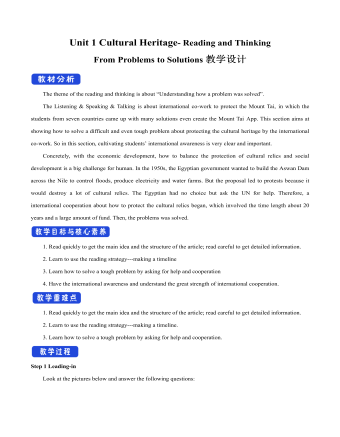
新人教版高中英语必修2Unit 1 Cultural Heritage-Reading and Thinking教案一
The theme of the reading and thinking is about “Understanding how a problem was solved”.The Listening & Speaking & Talking is about international co-work to protect the Mount Tai, in which the students from seven countries came up with many solutions even create the Mount Tai App. This section aims at showing how to solve a difficult and even tough problem about protecting the cultural heritage by the international co-work. So in this section, cultivating students’ international awareness is very clear and important. Concretely, with the economic development, how to balance the protection of cultural relics and social development is a big challenge for human. In the 1950s, the Egyptian government wanted to build the Aswan Dam across the Nile to control floods, produce electricity and water farms. But the proposal led to protests because it would destroy a lot of cultural relics. The Egyptian had no choice but ask the UN for help. Therefore, a international cooperation about how to protect the cultural relics began, which involved the time length about 20 years and a large amount of fund. Then, the problems was solved. 1. Read quickly to get the main idea and the structure of the article; read careful to get detailed information.2. Learn to use the reading strategy---making a timeline3. Learn how to solve a tough problem by asking for help and cooperation4. Have the international awareness and understand the great strength of international cooperation.1. Read quickly to get the main idea and the structure of the article; read careful to get detailed information.2. Learn to use the reading strategy---making a timeline.3. Learn how to solve a tough problem by asking for help and cooperation.

新人教版高中英语必修2Unit 3 The Internet-Discovering Useful Structure教案一
This unit is about the Internet, which has a great influence to our humans and our lives. During the Listening & Speaking & Talking and Reading and Thinking section, the influence in examples has been shown. Thus, use the Present Perfect Tense is appropriate. However, in order to show the justice or weaken the doer of the behavior/action, it’s better to use the Present Perfect Passive Voice than the Present Perfect Tense. Besides, having learned to use the Present Perfect Passive Voice, students can beautify their language in their writing. 1. Learn the structure of the Present Perfect Passive Voice and its functions. 2. Learn to change the sentences with the Present Perfect Passive Voice into the sentences with the Present Perfect Passive Voice. 3. Learn to write sentences with the Present Perfect Passive Voice flexibly according to the context. 1. Learn the structure of the Present Perfect Passive Voice and its functions. 2. Learn to change the sentences with the Present Perfect Passive Voice into the sentences with the Present Perfect Passive Voice. 3. Learn to write sentences with the Present Perfect Passive Voice flexibly according to the context. Step 1 Observe the following sentences, then change the sentences into passive voice.He has been selected to take part in the sports meeting.(肯定句)他已被挑选出来参加运动会。The ink has not been removed from his overcoat.(否定句)墨迹还没有从他外套上去掉。

新人教版高中英语必修2Unit 3 The Internet-Listening &Speaking&Talking教案一
Listening and Speaking introduces the topic of “ask about online habits”. Many middle school students have been surfing the Internet for many years, but what they do with the Internet and how much time they spend every day may not be very clear to themselves, nor to other students. This section allows students to investigate their peers' Internet use, which is conducive to their mutual understanding and understanding of the Internet. It can also help them reflect on their own online behavior, learn from other people's good online habits, and get rid of their bad online behavior.The listening text of this section is an investigation interview. The investigators interview specific groups with the same questions to obtain information, so as to understand their views, practices or attitudes on this issue. There are two specific questions: “how much time do you spend online every day? What do you usually do online?”. The answers of the three respondents provide rich and different information, and achieve the purpose of the investigators. The oral discourse structure of survey interviews generally includes greeting and explaining the purpose of the interview, presenting the interview questions and the respondents' answers. Listening and Talking introduces the theme of “choosing the right application ". Listening text is a conversation between Laura and Xiao Bo. In this part of listening, “oink”; “piggy bank” may cause the students' hearing comprehension limitation. Oink refers to sound word and pig's sound. So, add some oink to my piggy bank is often used to describe "making a little money".1. Guide students to understand the content of listening texts in terms of listening for definitions.2. Cultivate students' ability to define words and understand an investigation interview.

新人教版高中英语必修2Unit 4 History and Traditions-Discovering Useful Structure教案一
Step 5 Practice一、完成下列句子。1. Judy and I _______________(把车停下来(park))in an underground car Park near Trafalgar Square, where we could ______________________(让我们的车充电(charge)).2. When we finally reached the service desk to ask for audio guides, we heard it ___________ that there were no audio guides____________(留下,剩下).3. We__________________________(发现自己对...很惊讶)the large number of visitors and the amount of noise at the entrance of the National Gallery.4. Judy ____________________(眼神专注于) Van Gogh’s Sunflowers. It was hard to approach the painting as there were so many people around.5. She ____________________(把这幅画的复制品装箱(box)) to ensure that it was delivered safely.答案:1.had our car parked get our car battery charged 2. announced left 3. found ourselves very surprised 4. had her eyes fixed on 5. had a copy of the painting boxed二、用过去分词对下列句子进行改写。1. Loch Ness was surrounded by beautiful natural landscape, which made it look amazing.2. Carl and his friend stayed with a generous family who offered them bread with butter and honey that was homemade.3. The family’s ancestors once attended to soldiers who were wounded in the First World War.4. The young people were attracted by the legend of Loch Ness. They watched over the lake with their cameras and binoculars, which were positioned on the hill.答案:1. Loch Ness surrounded by beautiful natural landscape looks amazing.2. Carl and his friends stayed with a generous family who offered them homemade bread with butter and honey.3. The family’s ancestors once attended to wounded soldiers in the First World War.4. The young people attracted by the legend of Loch Ness watched over the lake with their cameras and binoculars positioned on the hill.

新人教版高中英语必修2Unit 3 The Internet-Reading and Thinking教案一
Paragraph 3. Jan decided to start an IT club to teach old people how to use computers and the Internet. Paragraph 4. Jan has started taking online classes to learn more about how to use the Internet to make society better. Paragraph 5. Jan’s life has been greatly improved by the Internet. Step 5: Critical thinking:(1)How do you arrange your time spent on study and the Internet? Is it reasonable? I usually surf the Internet using my mobile phone for only an hour after class, and it is reasonable for me.(2)What are your online activities? Are they safe? I chat with my friends, read news and play games. I never give away my private information so I think they are safe.Step 4: summary Much has been written about the wonders of the World Wide Web. There are countless articles (1)______(tell) us how the Internet has made our lives more convenient. But the Internet has done a lot (2)_____(much) for people than simply make life more convenient. People’s lives (3) _________________(change) by online communities and social networks so far. Take Jan for example, who developed a serious illness that made her (4)_____(stick) at home with only her computer to keep (5)___(she) company. She joined an online group (6)______ she could share problems, support and advice with others. She considered the ability to remove the distance between people as one of the greatest (7)_______(benefit). She was so inspired (8)____ she started an IT club in which many people have been helped. She has started to learn more about how to use the Internet to make society better. Her next goal is to start a charity website to raise money (9)___ children in poor countries. Jan’s life has been (10)______(great) improved by the Internet. Step 5 Homework:Review what we have learned and find out the key language points in the text.

新人教版高中英语必修2Unit 4 History and Traditions-Listening&Speaking&Talking教案一
This unit is about history and traditions. From the opening page, we can know that this unit will introduce the history and traditions around the world. As Marcus Garvey says “A people without the knowledge of their past history, origin and culture is like a tree without roots”, it is important for students to realize the importance and value of knowing the history and traditions and their further meanings. And this part ( listening and speaking ) is divided into two parts: Part A---share views on historic sites, Part B ---talk about a visit to a historic tourist destination. By talking with a foreigner, the speakers introduce the historic attractions and their cultures. Part A is that William, a British student, who was going to visit the Confucius Temple and a Chinese student, Xiao Kong, who was going to the Confucius Temple to meet with the members of the research group, went together and exchanged their views on the Confucius Temple, Confucius, Confucius' descendants and Confucius' educational thoughts. Part B is a conversation between Xiao Yan, a youth hostel receptionist and Paul, a backpacker about the feelings and experience after visiting the Chinese famous tourist attraction Pingyao.1. Guide students to understand the content of listening texts in terms of the whole and key details; 2. Cultivate students' ability to guess the meaning of words in listening; discuss with their peers how to talk about historic spots and great person.3. Instruct students to use functional sentences of showing one’s excitement, surprise and disappointment.1. Guide students to understand the content of listening texts in terms of the whole and key details; 2. Cultivate students' ability to discuss with their peers the related topics.3. Enable students to use the functional items of showing one’s excitement, surprise and disappointment.

新人教版高中英语必修2Unit 3 The Internet-Reading For Writing教案一
⑦identity theft 身份盗窃⑧chat room 聊天室⑨draft your blog post 起草博客帖子⑩post embarrassing photos 张贴尴尬照片 【话题句式】 1. How do you stay safe online and avoid bad experiences on the Internet? 你如何在网上保持安全, 避免在网上的不良经历? 2. I’m not an expert, but many years as a blogger have taught me a thing or two. 我不是专家, 但作为一个博主, 我已经学了好几年了。 3. If you see or read something that makes you feel uncomfortable, leave the site immediately. 如果你看到或读到一些让你觉得不舒服的东西, 立即离开这个网站。4. Don’t give out your address or phone number. 别告诉别人你的地址或电话号码。 5. Identity theft is a common and serious problem. 身份盗窃是一个常见而严重的问题。6. Being online is no excuse for being rude, and you don’t want to become a target for a troll or cyberbully. 上网并不是无礼的借口, 你也不想成为发挑衅帖子的人或网络恶霸的目标。 7. Trolls often use several false names so that they can stay on a site. 发挑衅帖子的人经常使用几个假名, 这样他们就可以留在一个网站上。8. However, the more polite you are, the less likely it is you will be attacked. 然而, 你越有礼貌, 你被攻击的可能性就越小。

新人教版高中英语必修2Unit 4 History and Traditions-Reading and Thinking教案一
Features of languages1.Finally, in the 20th century, the southern part of Ireland broke away from the UK, which resulted in the full name we have today: the United Kingdom of Great Britain and Northern Ireland.该句是一个复合句。该句主句为:the southern part of Ireland broke away from the UK;which resulted in the full name we have today为which引导的定语从句代指前面整句话的内容,we have today为定语从句修饰先行词name。译文:最后,在20世纪,爱尔兰南部脱离英国,这导致了我们今天有的英国的全名:大不列颠及北爱尔兰联合王国。2.Almost everywhere you go in the UK, you will be surrounded by evidence of four different groups of people who took over at different times throughout history.该句是一个复合句。该句主句为:you will be surrounded by evidence of four different groups of people;其中Almost everywhere you go in the UK为让步状语从句; who took over at different times throughout history为定语从句修饰先行词people。译文:几乎无论你走到英国的任何地方,你都会发现历史上有四种不同的人在不同的时期统治过英国。3.The capital city London is a great place to start, as it is an ancient port city that has a history dating all the way back to Roman times.该句是一个复合句。该句主句为:The capital city London is a great place to start; as it is an ancient port city that has a history dating all the way back to Roman times.为原因状语从句;dating all the way back to Roman times为现在分词短语作定语修饰history。

新人教版高中英语必修2Unit 5 Music-Discovering Useful Structures教案一
Step1:自主探究。1.(教材P52)Born(bear) in the USA on 2 January 1970, Whitacre began studying music at the University of Nevada in 1988.2.(教材P52) Moved(move) by this music, he said, “It was like seeing color for the first time.”3.(教材P56)I was very afraid and I felt so alone and discouraged(discourage).4.(教材P58)Encouraged(encourage) by this first performance and the positive reaction of the audience, I have continued to play the piano and enjoy it more every day.Step2:语法要点精析。用法1:过去分词作表语1).过去分词可放在连系动词be, get, feel, remain, seem, look, become等之后作表语,表示主语所处的状态Tom was astonished to see a snake moving across the floor.汤姆很惊讶地看到一条蛇正爬过地板。Finally the baby felt tired of playing with those toys.终于婴儿厌倦了玩那些玩具。注意:1).过去分词作表语时与被动语态的区别过去分词作表语时,强调主语所处的状态;而动词的被动语态表示主语是动作的承受者,强调动作。The library is now closed.(状态)图书馆现在关闭了。The cup was broken by my little sister yesterday.(动作)昨天我妹妹把杯子打碎了。2)感觉类及物动词的现在分词与过去分词作表语的区别过去分词作表语多表示人自身的感受或事物自身的状态,常译作“感到……的”;现在分词多表示事物具有的特性,常译作“令人……的”。
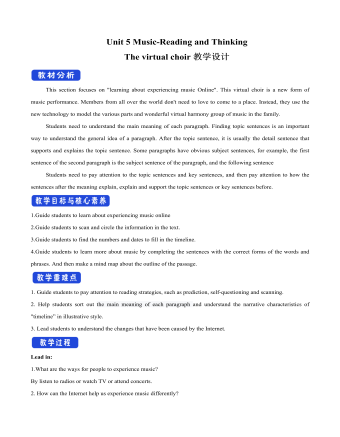
新人教版高中英语必修2Unit 5 Music-Reading and Thinking教案一
This section focuses on "learning about experiencing music Online". This virtual choir is a new form of music performance. Members from all over the world don't need to love to come to a place. Instead, they use the new technology to model the various parts and wonderful virtual harmony group of music in the family. Students need to understand the main meaning of each paragraph. Finding topic sentences is an important way to understand the general idea of a paragraph. After the topic sentence, it is usually the detail sentence that supports and explains the topic sentence. Some paragraphs have obvious subject sentences, for example, the first sentence of the second paragraph is the subject sentence of the paragraph, and the following sentenceStudents need to pay attention to the topic sentences and key sentences, and then pay attention to how the sentences after the meaning explain, explain and support the topic sentences or key sentences before.1.Guide students to learn about experiencing music online2.Guide students to scan and circle the information in the text.3.Guide students to find the numbers and dates to fill in the timeline.4.Guide students to learn more about music by completing the sentences with the correct forms of the words and phrases. And then make a mind map about the outline of the passage.1. Guide students to pay attention to reading strategies, such as prediction, self-questioning and scanning.2. Help students sort out the main meaning of each paragraph and understand the narrative characteristics of "timeline” in illustrative style.3. Lead students to understand the changes that have been caused by the Internet.
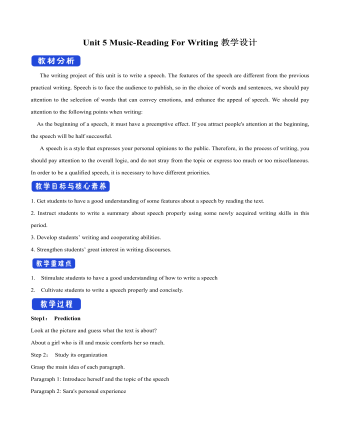
新人教版高中英语必修2Unit 5 Music-Reading For Writing教案一
(4)Now we have heard a number of outstanding speeches ... 我们已经聆听了许多精彩的发言……(5)Because we wanted the nations of the world, working together, to deal with ... 因为我们希望全世界各国团结起来去应对……(6)And if we do not act ... 如果我们不采取行动……(7)Now, I share the concerns that have been expressed ... 我也同意对于……表达的担心(8)Let us show the world that by working together we can ... 让我们告诉全世界,通过一起努力我们可以……(9)It is now time for us to ... 是时候我们……(10)And I have always wished that ... 我一直希望……(11)Thank you for letting me share this day with me.感谢你们和我共度这一天。实践演练:假如你是高中生李华,你校将举办一次以“音乐”为主题的演讲比赛,请你按照主题,写下你的演讲稿。注意:词数100左右。First of all, thank you for listening to my speech. My topic is: love music like love yourself.Music is like the air we need to maintain our normal lives around us. You can't imagine how terrible a world without music would be. Movies and TV shows have no music, only dry conversations and scenes; mobile phones only vibrations; streets only noisy crowds; cafes, western restaurants only depressed meals. What a terrible world it is!As a student, I hope we all can enjoy the fun brought by music in our spare time. Instead of just listening to music, we can even make our own music. Let's enjoy the fun of music!Thanks again for your attention!
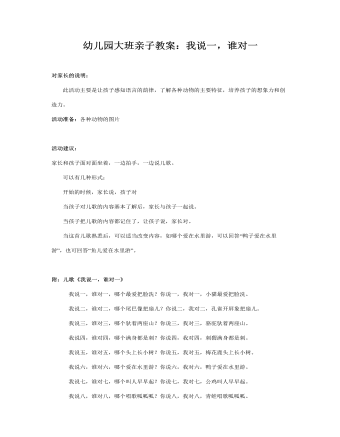
幼儿园大班亲子教案:我说一,谁对一
活动准备:各种动物的图片 活动建议:家长和孩子面对面坐着,一边拍手,一边说儿歌。 可以有几种形式: 开始的时候,家长说,孩子对 当孩子对儿歌的内容基本了解后,家长与孩子一起说。 当孩子把儿歌的内容都记住了,让孩子说,家长对。 当这首儿歌熟悉后,可以适当改变内容,如哪个爱在水里游,可以回答“鸭子爱在水里游”,也可回答“鱼儿爱在水里游”。
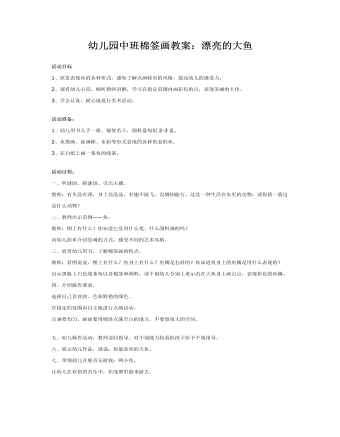
中班棉签画教案:漂亮的大鱼课件教案
2、观看幼儿示范,倾听教师讲解,学习在指定范围内画彩色的点,表现美丽的大鱼。 3、学会认真、耐心地进行美术活动。 活动准备: 1、幼儿用书人手一册,棉签若干,颜料盘每组2-3盘。 2、水墨画、油画棒、水彩等形式表现的各种形态的鱼。 3、在白纸上画一条鱼的线条。 活动过程:一、听谜面、猜谜语、引出主题。 教师:有头没有颈,身上亮晶晶,有翅不能飞,没脚倒能行。这是一种生活在水里的动物,请你猜一猜这是什么动物?
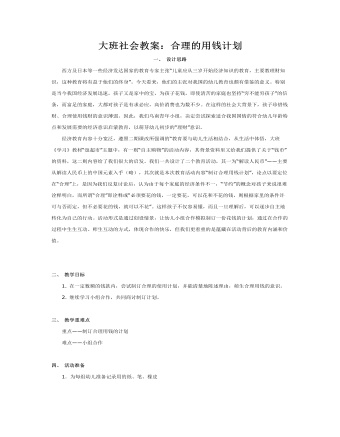
大班社会教案:合理的用钱计划
经济教育内容十分宽泛,遵照二期课改所强调的“教育要与幼儿生活相结合,从生活中体悟,大班《学习》教材“逛超市”主题中,有一则“自主购物”的活动内容,其背景资料里又给我们提供了关于“钱币”的资料,这二则内容给了我们很大的启发。我们一共设计了二个教育活动,其一为“解读人民币”——主要从解读人民币上的中国元素入手(略),其次就是本次教育活动内容“制订合理用钱计划”,论点以要定位在“合理”上,是因为我们反复讨论后,认为由于每个家庭的经济条件不一,“节约”的概念对孩子来说很难诠释明白,而所谓“合理”即诠释或“必须要花的钱,一定要花,可以花和不花的钱,则根据家里的条件许可与否而定,但不必要花的钱,就可以不花”。这样孩子不仅容易懂,而且一旦理解后,可以逐步自主地转化为自己的行动。活动形式是通过创设情景,让幼儿小组合作模拟制订一份花钱的计划,通过在合作的过程中生生互动、师生互动的方式,体现合作的快乐,但我们更看重的是蕴藏在活动背后的教育内涵和价值。
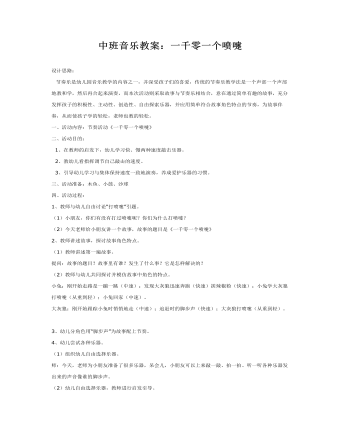
中班音乐教案:一千零一个喷嚏
一、活动内容:节奏活动《一千零一个喷嚏》 二、活动目的: 1、在教师的启发下,幼儿学习快、慢两种速度敲击乐器。 2、教幼儿看指挥调节自己敲击的速度。 3、引导幼儿学习与集体保持速度一致地演奏,养成爱护乐器的习惯。 三、活动准备:木鱼、小鼓、沙球 四、活动过程: 1、教师与幼儿自由讨论“打喷嚏”引题。 (1)小朋友,你们有没有打过喷嚏呢?你们为什么打喷嚏? (2)今天老师给小朋友讲一个故事,故事的题目是《一千零一个喷嚏》 2、教师讲述故事,探讨故事角色特点。 (1)教师讲述第一遍故事。 提问:故事的题目?故事里有谁?发生了什么事?它是怎样解决的?
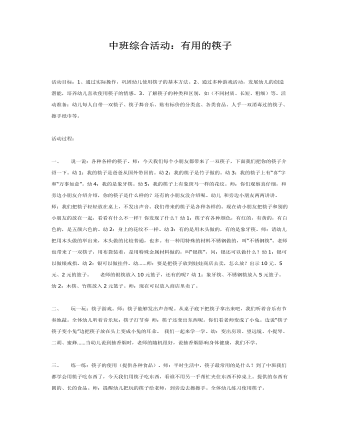
中班综合活动教案有用的筷子
活动过程: 一、 说一说:各种各样的筷子。师:今天我们每个小朋友都带来了一双筷子,下面我们把你的筷子介绍一下。幼1:我的筷子是爸爸从国外带回的。幼2:我的筷子是竹子做的。幼3:我的筷子上有“喜”字和“万事如意”。幼4:我的是象牙筷。幼5:我的筷子上有象斑马一样的花纹。师:你们观察真仔细,和旁边小朋友介绍介绍,你的筷子是什么样的?还有的小朋友没介绍呢。幼儿和旁边小朋友两两讲讲。师:我们把筷子轻轻放在桌上,不发出声音。我们带来的筷子是各种各样的。现在请小朋友把筷子和别的小朋友的放在一起,看看有什么不一样?你发现了什么?幼1:筷子有各种颜色,有红的,有黄的,有白色的,是五颜六色的。幼2:身上的花纹不一样。幼3:有的是用木头做的,有的是象牙筷。师:请幼儿把用木头做的举出来,木头做的比较普通,也多。有一种用特殊的材料不锈钢做的,叫“不锈钢筷”。老师也带来了一双筷子,用布袋装着,是用特殊金属材料做的,叫“银筷”,问:银还可以做什么?幼1:银可以做银戒指。幼2:银可以做挂件。幼……师:要是把筷子放到娃娃商店去卖,怎么放?出示10元、5元、2元的篮子。 老师的银筷放入10元篮子,还有的呢?幼1:象牙筷、不锈钢筷放入5元篮子。幼2:木筷、竹筷放入2元篮子。师:现在可以放入商店里卖了。
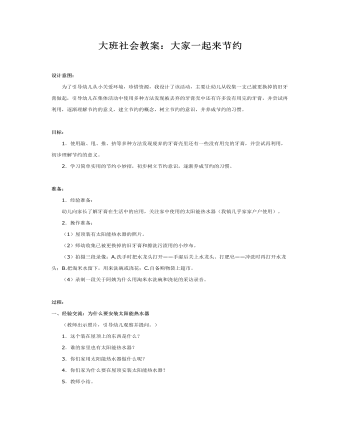
大班社会教案:大家一起来节约
目标:1.使用敲、甩、推、挤等多种方法发现废弃的牙膏壳里还有一些没有用完的牙膏,并尝试再利用,初步理解节约的意义。2.学习简单实用的节约小妙招,初步树立节约意识,逐渐养成节约的习惯。 准备:1.经验准备: 幼儿向家长了解牙膏在生活中的应用,关注家中使用的太阳能热水器(我镇几乎家家户户使用)。2.操作准备: (1)屋顶装有太阳能热水器的照片。 (2)师幼收集已被更换掉的旧牙膏和擦洗污渍用的小纱布。 (3)拍摄三段录像:A.洗手时把水龙头打开——手湿后关上水龙头、打肥皂——冲洗时再打开水龙头;B.把淘米水留下,用来洗碗或浇花;C.自备购物袋上超市。 (4)录制一段关于阿姨为什么用淘米水洗碗和浇花的采访录音。
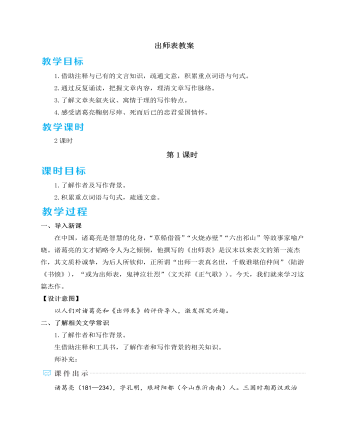
人教部编版语文九年级下册出师表教案
2.分析写作特点。本文是如何把议论、抒情和叙事融为一体的?预设 本文是奏章,内容是作者出师前向后主刘禅陈述意见,提出修明政治、兴复汉室的主张。因此,全文以议论为主,在议论中融以叙事和抒情,以做到对刘禅晓之以理、动之以情而达到劝谏的目的。论述切中要害,分析透辟,针对性强;寓情于议,情理交融,言辞恳切,说服力强。叙事,寓情于事,委婉动人,感情真挚。所叙之事如推荐贤才,讲身世,谈经历,都是为议论服务,使他对刘禅提出的建议与要求有理有据,更能使人信服。 结束语:诸葛亮知恩图报,忠心为国。他有高度的责任感、使命感,他为国家鞠躬尽瘁,死而后已,当我们吟诵“出师未捷身先死,长使英雄泪满襟”的诗句时,会深深地体味出杜甫对诸葛亮的仰慕和惋惜之情;当我们解读“出师一表真名世,千载谁堪伯仲间”这两句诗时,更是深深地被陆游满腔豪情所感染。四、布置作业
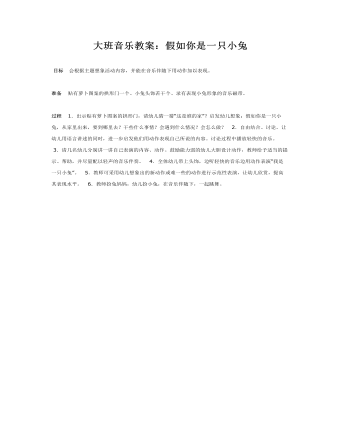
大班音乐教案:假如你是一只小兔
准备 贴有萝卜图案的拱形门一个、小兔头饰若干个、录有表现小兔形象的音乐磁带。 过程 1.出示贴有萝卜图案的拱形门,请幼儿猜一猜“这是谁的家”?启发幼儿想象:假如你是一只小兔,从家里出来,要到哪里去?干些什么事情?会遇到什么情况?会怎么做? 2.自由结合、讨论。让幼儿用语言讲述的同时,进一步启发他们用动作表现自己所说的内容。讨论过程中播放轻快的音乐。


